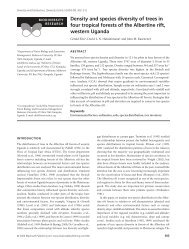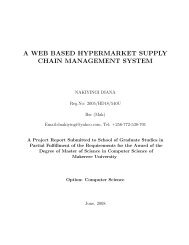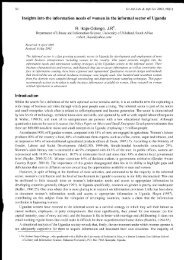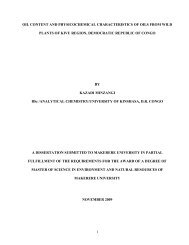THE UNIVERSITY OF LEIPZIG
THE UNIVERSITY OF LEIPZIG
THE UNIVERSITY OF LEIPZIG
You also want an ePaper? Increase the reach of your titles
YUMPU automatically turns print PDFs into web optimized ePapers that Google loves.
communications and authority relations”. 196 Boundedness is relevant for both kinds of<br />
rationality as defined above.<br />
In the case of individual rationality as maximization, it implies that since maximizing is costly<br />
and indeed very costly as defined– satisfying would be the only realistic option. 197 More still,<br />
one could retain the focus on individual utility. While one would like to build social choices<br />
on aggregating such individual satisfying behaviour is another issue. 198 Material welfare<br />
economists attempted to compare the well-being of social groups but refrained from<br />
comparing the utility of individual persons. 199 This presents us with a dilemma, since we tend<br />
to gang up individual interests as if they happen in the same place and time!<br />
Concerning the social forms of rationality, one could make similar claims. 200 Individuals may<br />
not always be able to follow norms, or act reciprocally because they misinterpret the situation<br />
or do not take the time necessary to figure out what it demands. 201 While boundedness applies<br />
to both models of rationality, it should be emphasized that conventions and norms may both<br />
be viewed also as responses to problems appearing when solving complex choice problems. 202<br />
Thus boundedness is in a way already captured by the classical view. Conventions and norms<br />
are a solution to individually intractable or very difficult choice problems. 203<br />
Katznelson and Weingast in a comparative analysis of rational choice and historical<br />
institutionalisms, explain that the breakdown of institutions can lead to institutional conflict<br />
and thus impose costs on all parties involved. 204 In the first application, the duo asks why we<br />
have ethnic conflict in resource management when it is too costly for those using natural<br />
resources. The simple answer is; ethnic conflict is irrational but this answer does not resolve<br />
the fundamental institutional puzzle. 205<br />
Therefore we note that this sub-set of institutionalism has come under criticism by analysts<br />
like Bell. He argues that the rational choice approach borrows heavily from economics and<br />
adopts a ‘deductive’methodology. This, he explains, results from the fact that explanations<br />
and working hypotheses are‘deduced’ from abstracted first principle assumptions about the<br />
motives and preferences of actors. 206 As Fiorina points out, the rational choice approach as the<br />
196 Ibid.<br />
197 Weingast, B. 2002. Rational-Choice Institutionalism. in Political Science: The State of the Discipline, edited<br />
by I. Katznelson and H. Milner, 660-692. New York: W.W. Norton.<br />
198 Simon, H.A. 1979. Opcit.<br />
199 Fearson, J and D, Latin. 1996. Opcit.<br />
200 Vatn, A. 2004. Valuation and Rationality. Land Economics 8:1-18.<br />
201 Ibid.<br />
202 Knight, J. 1995. Models, Interpretations, and Theories, Constructing Explanations of Institutional<br />
Emergence and Change. In Explaining Institutions edited by J. Knight and I. Sened, 95-119. Ann Arbor:<br />
University of Michigan Press.<br />
203 March,J.G. 1994. A Primer on Decision-Making. How Decisions Happen. New York: Free Press.<br />
204 Katznelson, I and B. R, Weingast. 2005. Intersections Between Historical and Rational Choice<br />
Institutionalism. In Preferences and Situations:Intersections Between Historical and Rational Choice<br />
Institutionalism,edited by I.Katznelson and B, R. Weingast, 1-27. Newyork: Russell Sage Foundation.<br />
205 Ibid.<br />
206 Bell, S. 2002. The Limits of Rational Choice: New Institutionalism in the testbed of Central Banking Polics<br />
in Australia. Political Studies 50:477-496.<br />
43






